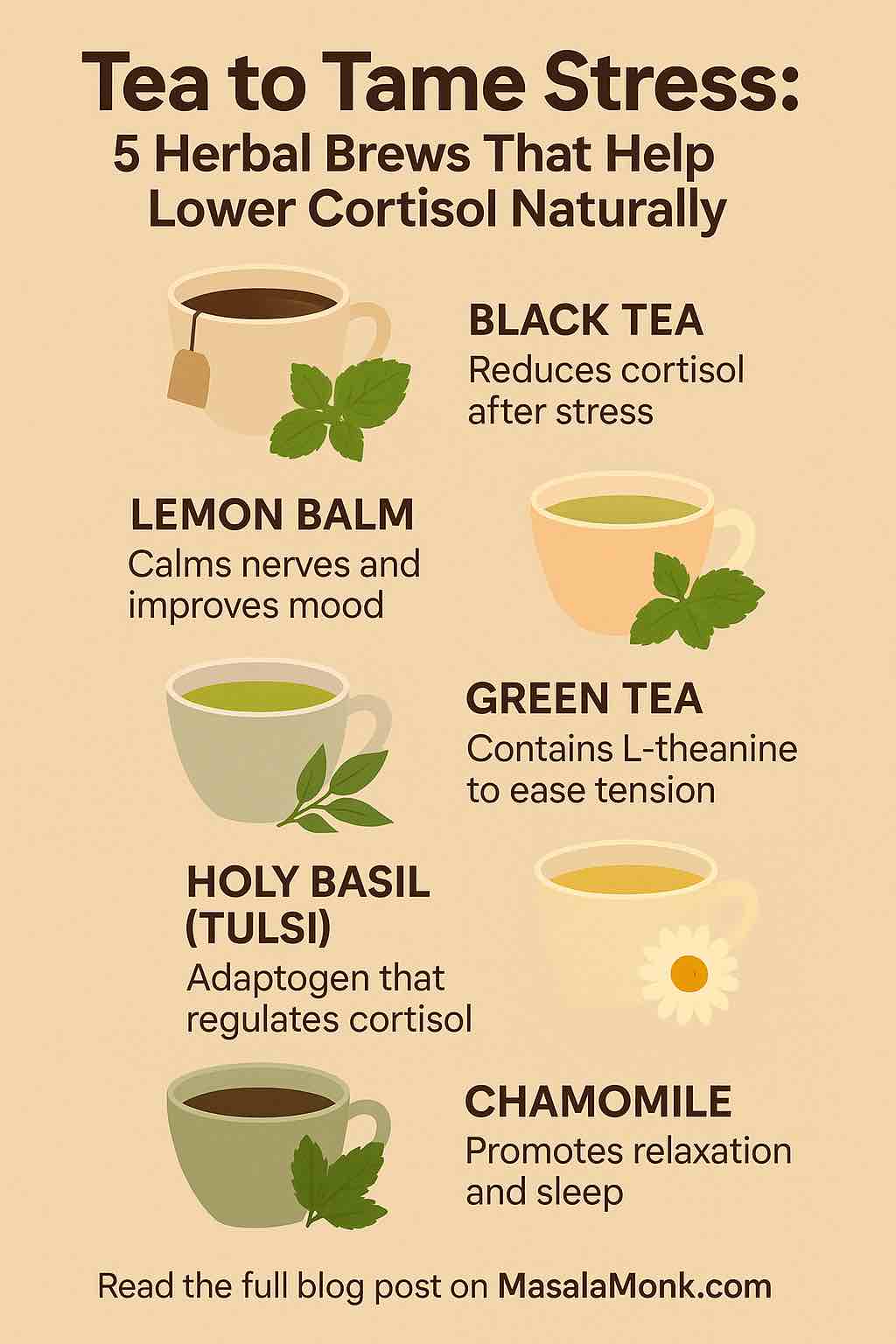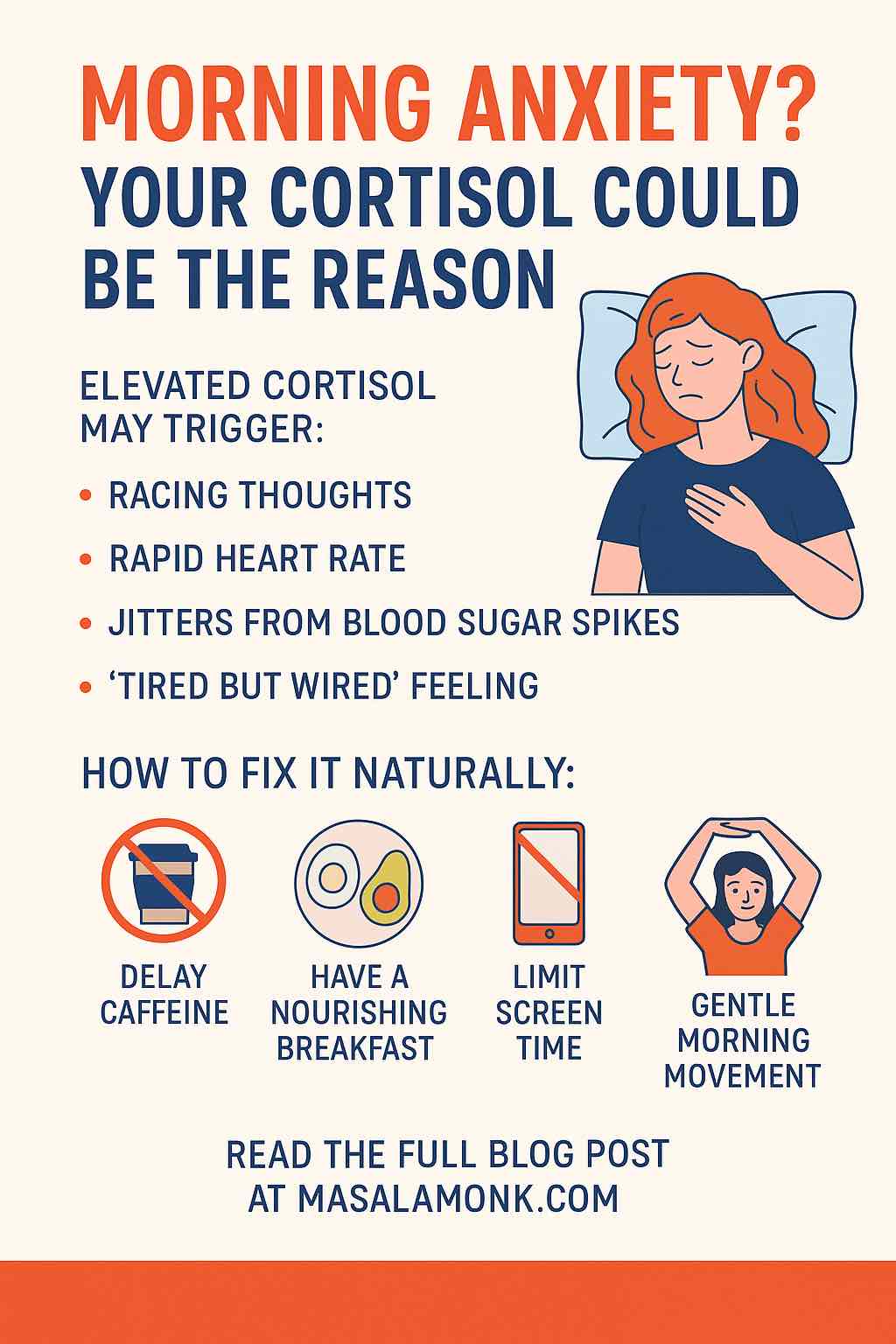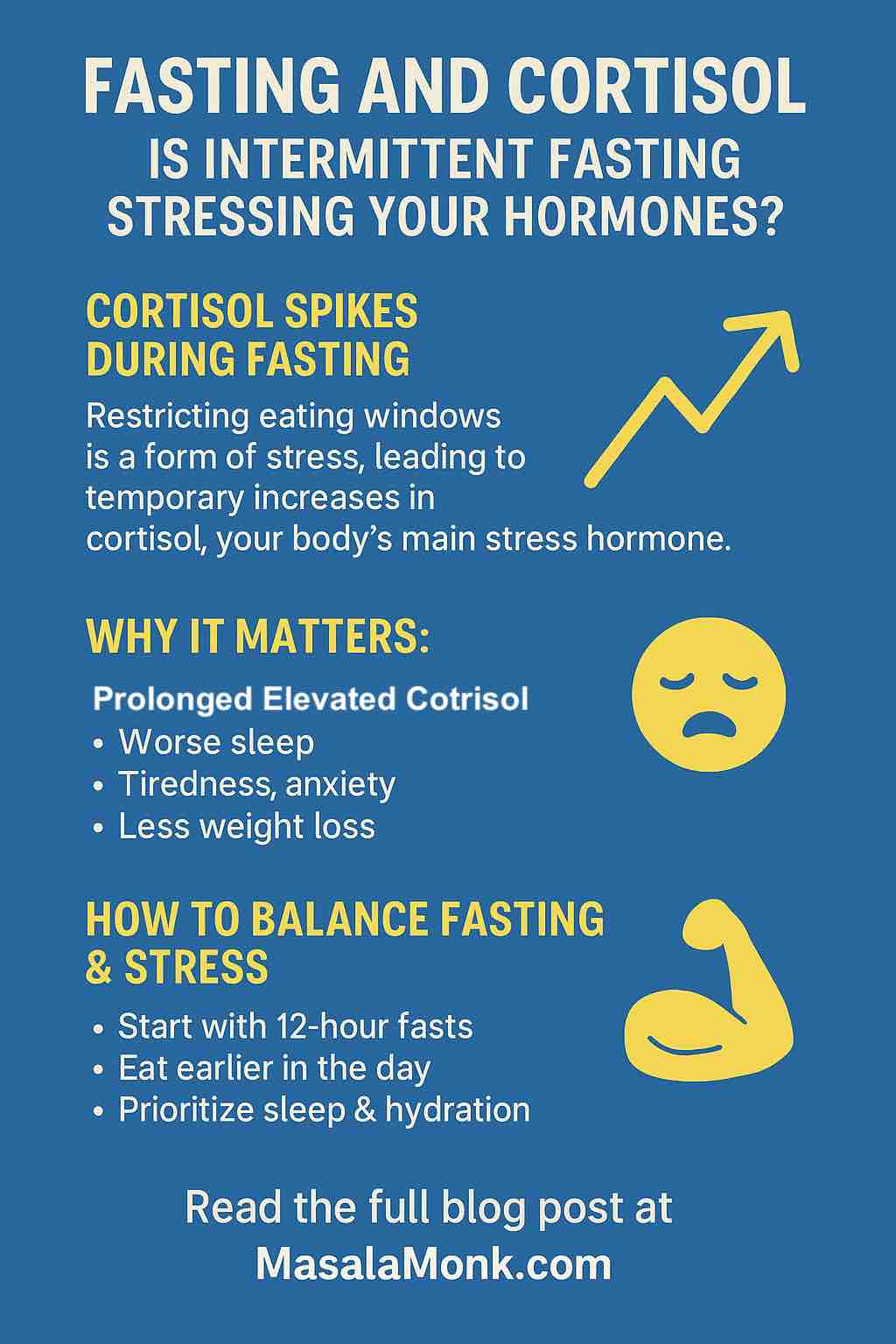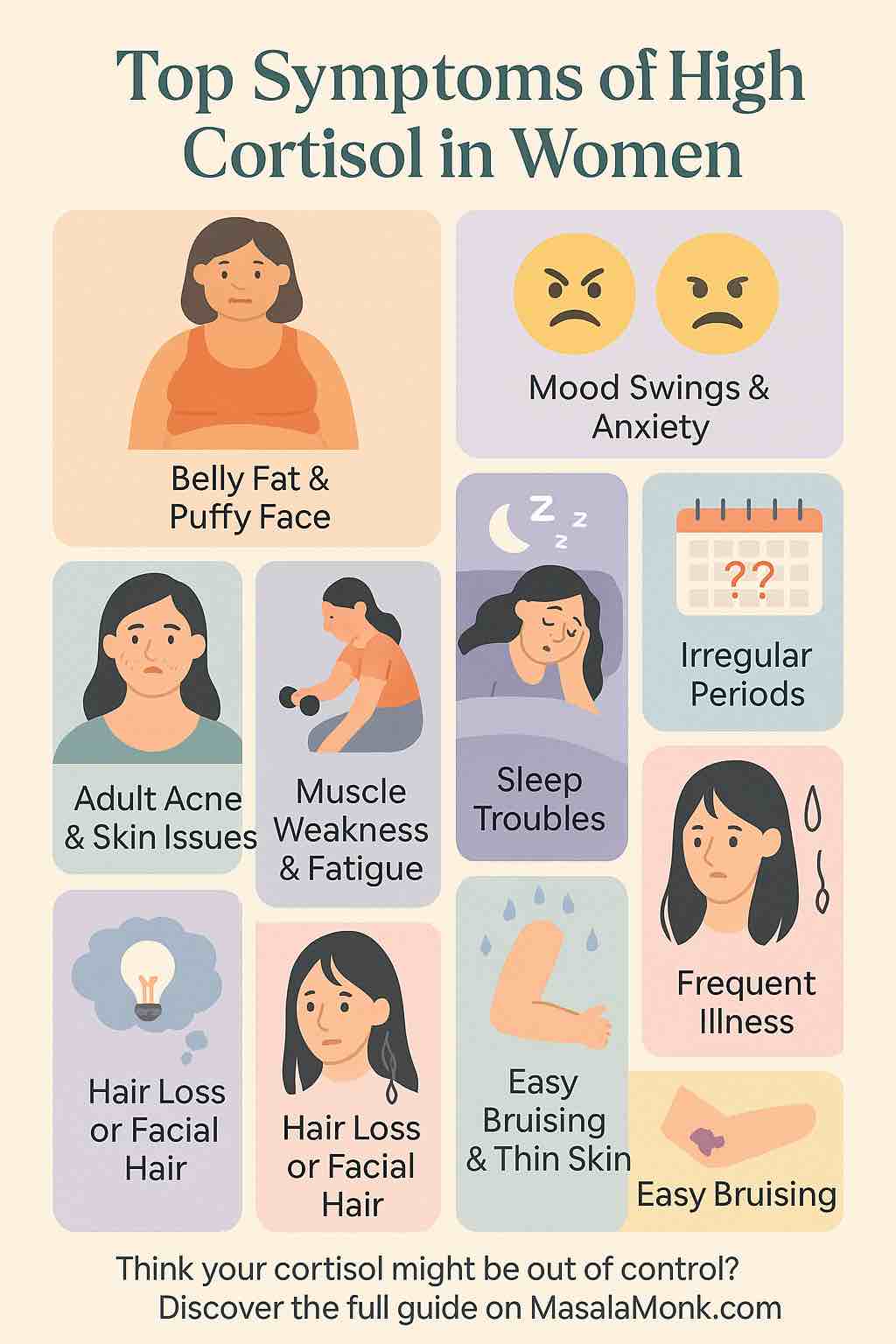
In today’s fast-paced, always-connected world, stress has become almost unavoidable. And behind that constant stress is a powerful hormone called cortisol. While cortisol is essential for energy, focus, and your body’s natural “fight-or-flight” response, too much of it for too long can quietly take a toll. In fact, high cortisol in women is increasingly common — and it often shows up in ways that feel confusing or overwhelming.
Think about it: unexplained weight gain even when you’re eating healthy, mood swings that seem to come out of nowhere, irregular periods, or a deep fatigue that no amount of coffee can fix. These aren’t just random struggles — they can be your body’s way of signaling that cortisol levels are out of balance. The good news is that by paying attention to these signs, you can take steps to bring your hormones back into harmony and feel more like yourself again.
So in this guide, let’s walk through:
- What cortisol is and why it matters
- The most common symptoms of high cortisol in females
- The root causes that push cortisol too high
- And practical, natural ways to support balance and recovery
🌟 What Is Cortisol and Why Is It Important?
Cortisol is a stress hormone produced by your adrenal glands, and it influences almost every system in your body. It helps regulate:
- Energy and metabolism
- Blood sugar and blood pressure
- Inflammation and immunity
- Your sleep-wake cycle
- Your ability to respond to stress
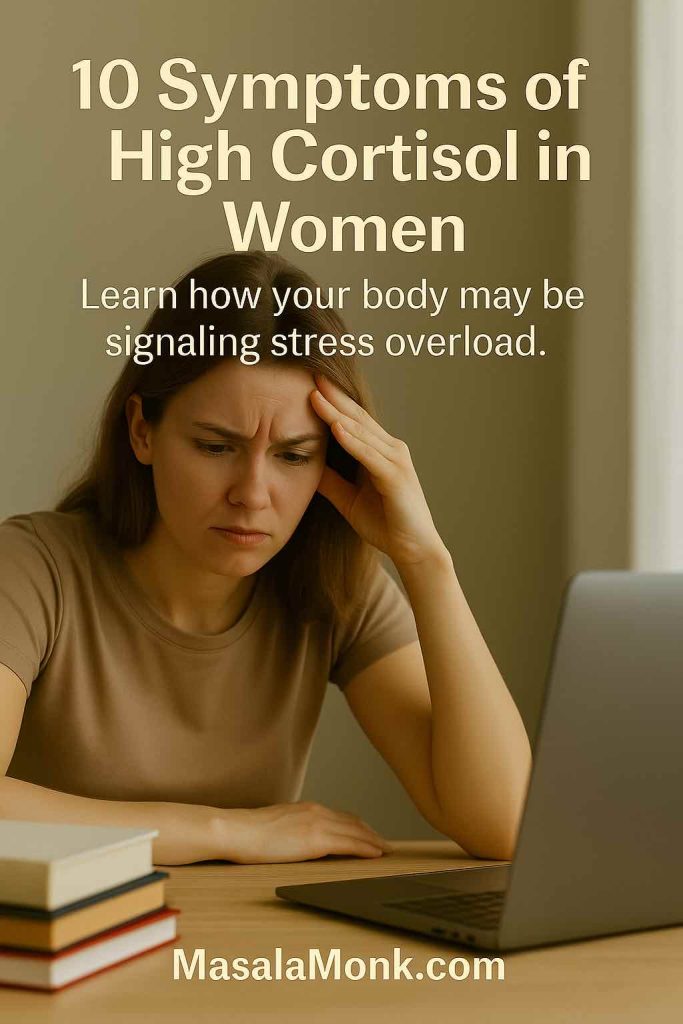
When everything is working as it should, cortisol gives you energy in the morning, helps you handle challenges throughout the day, and then tapers off at night so you can rest. But when stress piles up and cortisol remains high for too long, that balance breaks down. Over time, the very hormone designed to protect you can start creating problems of its own.
Want soothing drink ideas to help steady your stress levels? This post on “5 Soothing Drinks to Help Lower Cortisol and Calm Your Mind” offers easy, science-backed beverage choices for stress relief.
🔍 10 Symptoms of High Cortisol in Women
🧁 1. Weight Gain (Especially Around the Belly and Face)
One of the most noticeable effects of high cortisol in women is sudden weight gain — especially in the belly, face, and sometimes upper back. You might feel frustrated when the scale creeps up despite eating well or staying active.
This happens because cortisol tells your body to store fat for “survival.” Over time, this leads to abdominal fat, a rounded “moon face,” or a fatty deposit between the shoulders often called a “buffalo hump.” The Cleveland Clinic confirms these patterns as hallmark signs of high cortisol, and the Mayo Clinic notes they’re especially common in conditions like Cushing’s syndrome (Cleveland Clinic, Mayo Clinic).

If you’re curious how eating patterns play into cortisol balance, check out Masala Monk’s guide on “Fasting and Cortisol: Is Intermittent Fasting Stressing Your Hormones?” to explore how certain fasting habits can spike cortisol — and what you can do about it
💔 2. Mood Changes: Anxiety, Irritability, and Depression
Cortisol doesn’t just affect your body — it deeply impacts your emotions. Many women with high cortisol describe feeling constantly “on edge,” snapping more easily at loved ones, or sinking into periods of sadness they can’t explain.

Science backs this up. Studies have shown that women experiencing chronic cortisol surges are more likely to develop anxiety and depression. Experts at Benenden Hospital also note mood swings, irritability, and brain fog as classic signs of cortisol imbalance.
😴 3. Trouble Sleeping can signify high cortisol in women
Have you ever felt exhausted all day but wide awake the moment you hit the pillow? That “tired but wired” feeling is a telltale sign of high cortisol. Normally, cortisol peaks in the morning to energize you and tapers off at night for restful sleep. But when it stays elevated into the evening, falling asleep becomes a struggle.
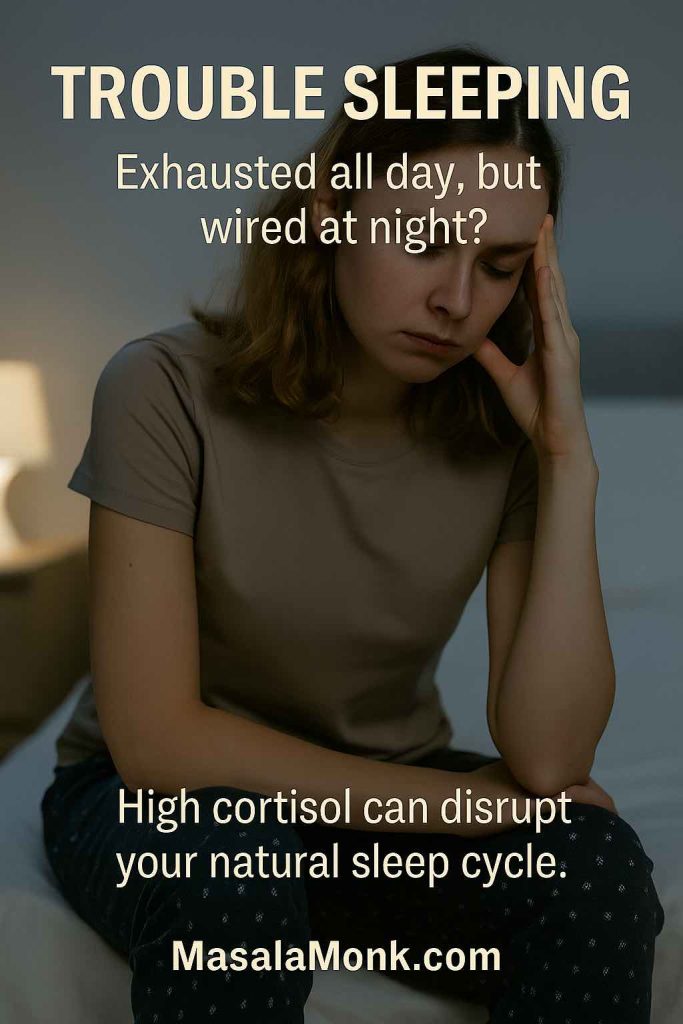
The Cleveland Clinic highlights that disrupted cortisol rhythms can lead to insomnia and poor-quality sleep. Lifestyle experts writing for Woman & Home further explain that chronically high evening cortisol often locks women into a cycle of restless nights and drained mornings (Cleveland Clinic, Woman & Home).
📉 4. Irregular or Missed Periods can be a sign of high cortisol in women
If your cycle has become irregular — or stopped altogether — cortisol could be the culprit. Stress hormones disrupt reproductive hormones like estrogen and progesterone, which can throw off your menstrual rhythm.
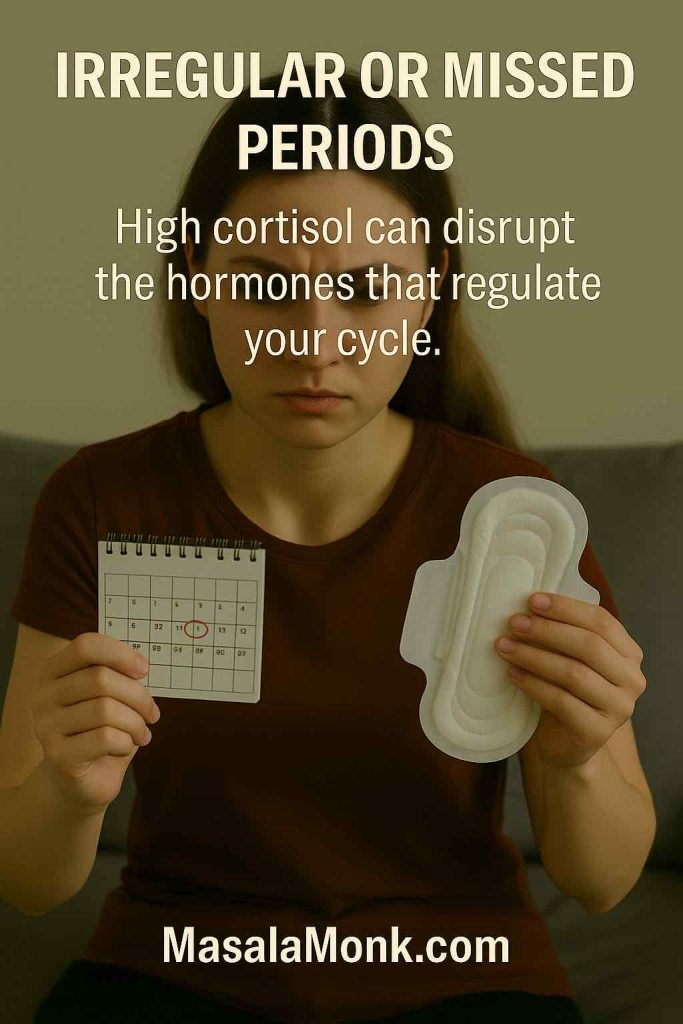
Women with high cortisol often report skipped periods, unusually heavy bleeding, or even trouble conceiving. The Mayo Clinic notes that these disruptions are particularly common when cortisol levels remain elevated over long periods (Mayo Clinic).
🪞 5. Skin Changes and Acne
If you’ve noticed breakouts that won’t clear up or skin that bruises easily, cortisol might be at play. High cortisol stimulates oil glands, often triggering hormonal acne around the chin and jawline. It also slows down your skin’s healing process, so blemishes and marks linger longer.

According to UT Southwestern Medical Center, fragile skin, delayed healing, and acne are clear signs of cortisol imbalance. Similarly, Adrenal.com reports that women often experience thinning skin and stretch marks alongside these changes (Adrenal.com).
💪 6. Muscle Weakness and Fatigue
High cortisol doesn’t just drain your energy — it can actually break down muscle tissue. Many women describe feeling weaker, slower, or less able to exercise the way they used to. Pair that with overwhelming fatigue, and even everyday tasks can start to feel harder than they should.

The Cleveland Clinic confirms that high cortisol can lead to muscle weakness in the upper arms and thighs, making physical activity more tiring than before (Cleveland Clinic).
🧠 7. Brain Fog and Memory Issues
If you’ve ever walked into a room and forgotten why, or struggled to recall simple words, high cortisol might be interfering with your memory. Cortisol can damage the hippocampus, the part of your brain responsible for learning and recall.

Over time, this shows up as brain fog, difficulty concentrating, and slower information processing. Research published in Frontiers in Neuroendocrinology also links chronic cortisol exposure to impaired memory and cognitive function.
🦴 8. Thinning Skin and Easy Bruising
As cortisol disrupts collagen production, your skin may become thinner and more fragile. Some women notice bruises appearing more easily than before, or even purple stretch marks on the abdomen, thighs, or breasts.

The Mayo Clinic lists these symptoms as classic indicators of excess cortisol, especially when paired with other physical changes (Mayo Clinic).
🧬 9. Hair Issues can represent high cortisol in women
High cortisol can also affect your hair. Women sometimes experience thinning or hair loss on the scalp, while others may develop excess facial or body hair (a condition called hirsutism). Both are signs of hormonal imbalance.

The Mayo Clinic confirms that excess cortisol can trigger these changes, particularly in women with conditions like PCOS or Cushing’s syndrome (Mayo Clinic).
⚠️ 10. Frequent Infections and Slow Wound Healing
If you’re catching colds more often than usual, or if small cuts seem to take forever to heal, cortisol may be to blame. Elevated levels suppress the immune system, leaving your body less able to fight infections and repair itself.
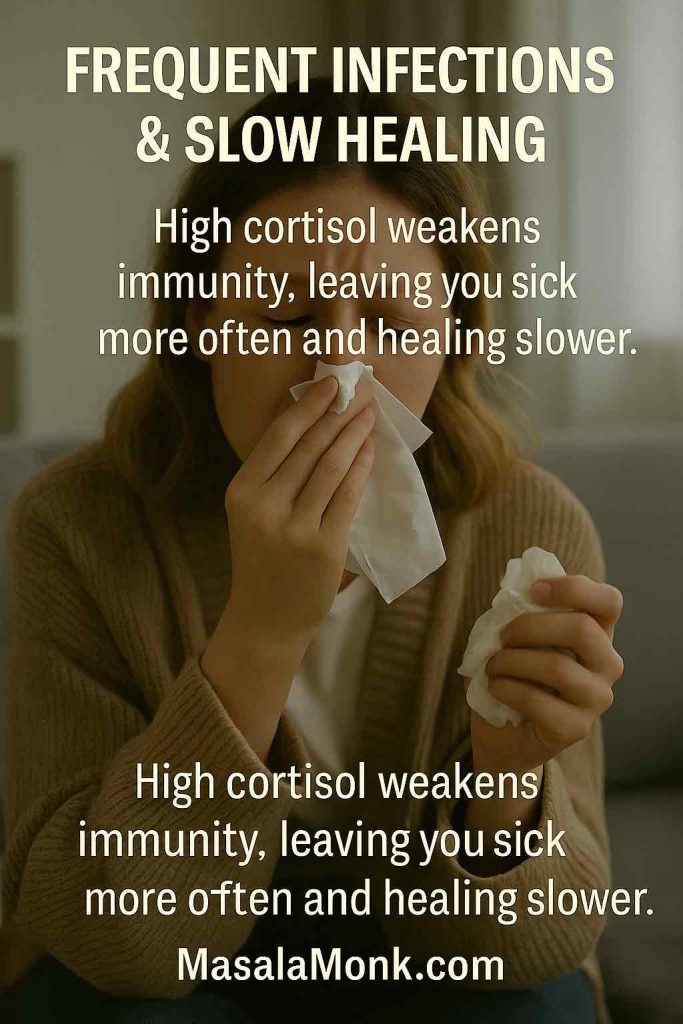
According to Benenden Hospital, high cortisol weakens immunity, while Adrenal.com highlights that women often experience more frequent illnesses when stress hormones stay elevated (Adrenal.com).
🧠 What Causes High Cortisol in Women?
When cortisol levels rise and stay elevated, there’s usually more than one factor at play. For women, it’s often a mix of lifestyle habits, stress patterns, and sometimes underlying health conditions. Understanding the “why” behind high cortisol can be empowering — because once you know the triggers, you can take steps to address them.
1. Chronic Stress
This is the most common cause. Whether it’s emotional stress from relationships and work or physical stress from illness and overexertion, your body keeps pumping cortisol as if you’re in constant “fight-or-flight.” The American Psychological Association notes that long-term stress is one of the biggest drivers of cortisol dysregulation.
2. Sleep Deprivation
Cortisol follows a natural rhythm — peaking in the morning, dipping at night. But when sleep is cut short or irregular, evening cortisol rises and mornings feel groggy. The Sleep Foundation explains that poor sleep not only raises cortisol but also worsens its effects on mood, memory, and metabolism.
3. Over-Exercising
Exercise is wonderful for stress relief, but too much high-intensity training without recovery can backfire. Women who push through workouts despite exhaustion may end up with chronically high cortisol. Harvard Health points out that while moderate exercise lowers cortisol, overtraining causes hormone spikes that disrupt balance.
4. Poor Diet
A diet heavy in refined sugar, processed foods, caffeine, and alcohol keeps cortisol elevated and blood sugar unstable. The Cleveland Clinic highlights that nutrient deficiencies — especially in magnesium and omega-3 fatty acids — can worsen cortisol’s impact.
Coffee lovers, take note: this post, “Coffee and Cortisol: How Your Daily Brew Impacts Stress, Weight, and Well‑Being,” explains how to savor your perk-up without fuelling cortisol overload.
5. Medical Conditions
Sometimes, elevated cortisol stems from health issues such as:
- Cushing’s Syndrome – often caused by adrenal or pituitary tumors.
- Polycystic Ovary Syndrome (PCOS) – linked to hormonal imbalance and insulin resistance.
- Hypothyroidism – which slows metabolism and can disrupt cortisol patterns.
If symptoms are severe or persistent, medical testing is crucial to rule out these conditions.
🧪 How to Know if You Have High Cortisol
If you’ve been nodding along to several of these symptoms, you might be wondering: How do I actually know if my cortisol is high? The truth is, the only way to be certain is through proper testing with a healthcare provider. Because cortisol naturally rises and falls throughout the day, the most accurate results often come from looking at patterns, not just one single number.
Here are the most common and trusted ways doctors measure cortisol:
1. Saliva Cortisol Test (4-Point Throughout the Day)
This is one of the simplest and most revealing tests. You collect small saliva samples at different times of the day—usually morning, midday, afternoon, and night. It’s noninvasive and can even be done at home with a kit.
Why it matters: cortisol should be high in the morning and taper off at night. If your rhythm is “flipped” or stays high in the evening, it’s a strong sign of imbalance. In fact, research shows that late-night saliva testing is one of the most sensitive tools for detecting conditions like Cushing’s syndrome (Wikipedia).
2. 24-Hour Urinary Free Cortisol (UFC)
This test measures the total amount of free cortisol your body excretes in urine over a full day. It gives a big-picture view of how much cortisol your body is producing on average.
Doctors often use this test when they suspect persistently elevated cortisol. However, it may sometimes show false positives in conditions like PCOS or sleep apnea, so it’s usually paired with other tests (Sage Journals).
3. Blood Cortisol (Morning and Afternoon)
A simple blood test can measure cortisol levels at fixed times—often early in the morning, when cortisol should be at its highest, and again in the afternoon, when it should have dropped.
According to the Cleveland Clinic, checking both points can reveal whether your body is following its natural rhythm—or stuck in a constant “on” mode (Cleveland Clinic).
Testing for high cortisol in women
| Test Type | What It Measures | Best For |
|---|---|---|
| 4-Point Saliva | Cortisol rhythm across the day | Seeing daily patterns of imbalance |
| Midnight Saliva | Late-night cortisol levels | High-accuracy screening for Cushing’s |
| 24-Hour Urinary Free Cortisol (UFC) | Total cortisol exposure over 24 h | Average exposure assessment |
| Blood (AM & PM) | Cortisol at fixed times | Evaluating cortisol rhythm & spikes |
🌿 Putting It All Together
Each test provides a different piece of the puzzle. Saliva testing shows your daily rhythm, urine testing shows your overall exposure, and blood testing shows specific highs and lows. When combined, they give a clear picture of whether cortisol is balanced—or if stress hormones are silently steering your health off course.
If you’re noticing several of the symptoms we’ve talked about—such as stubborn weight gain, mood swings, irregular cycles, or restless nights—it may be time to ask your doctor about these tests. Remember, you’re not overreacting: your body’s signals are valid, and testing is a powerful first step toward healing.
🌿 Natural Ways to fix High Cortisol in Women
The good news? Even if your cortisol feels out of control, there are proven, natural strategies to bring it back into balance. Small, consistent changes in your lifestyle can make a noticeable difference — helping you feel calmer, more energized, and hormonally aligned.
1. 🧘♀️ Practice Stress Management Daily
Start small: just 10 minutes of meditation, slow breathing, or journaling can signal safety to your body. Over time, these practices train your nervous system to relax. According to the National Center for Complementary and Integrative Health (NCCIH), mindfulness-based practices significantly reduce cortisol and stress symptoms.
2. 😴 Prioritize Deep, Consistent Sleep
Aim for 7–9 hours of quality sleep with a consistent bedtime. Keeping your evenings screen-free, dimming lights, and creating a wind-down routine can help lower nighttime cortisol. The Sleep Foundation emphasizes that good sleep hygiene directly supports balanced hormone levels.
3. 🍽 Eat to Nourish, Not Just Fill
Pair protein, healthy fats, and fiber at each meal to stabilize blood sugar (which keeps cortisol calmer). Add magnesium-rich foods like leafy greens, seeds, and nuts, and omega-3 sources like salmon. The Harvard School of Public Health notes that diets rich in whole foods, omega-3s, and fiber help regulate cortisol.
Whole foods matter—especially ones with stress-busting power. Explore “5 Foods That Naturally Decrease Cortisol” for delicious ways to calm your system, like avocado’s proven effects on stress reduction.
4. 🏃♀️ Move Smarter, Not Harder
Swap daily high-intensity workouts for a mix of strength training, yoga, swimming, or walking. These types of movement lower cortisol while still boosting fitness. Harvard Health explains that moderate activity improves stress resilience, while overtraining spikes stress hormones.
5. 🌞 Get Morning Sunlight
Stepping outside for natural light in the morning helps reset your circadian rhythm, which in turn keeps cortisol levels on track. The National Institutes of Health (NIH) highlights morning light exposure as one of the simplest yet most powerful ways to restore hormonal balance.
6. 🌿 Consider Adaptogens (With Guidance)
Herbs like ashwagandha, rhodiola, and holy basil have been shown in studies to support healthy stress responses. For example, a 2019 review in the Journal of Alternative and Complementary Medicine found that ashwagandha supplementation helped lower cortisol in chronically stressed adults. Always consult a healthcare provider before adding supplements.

👩⚕️ When to Seek Help
It’s easy to brush off symptoms of high cortisol in women as “just stress” or “getting older.” But if you’re noticing multiple signs piling up—like stubborn belly weight, mood swings, irregular or missed periods, poor sleep, or constant fatigue—it’s worth paying attention.
Reaching out to a healthcare provider doesn’t mean you’re overreacting. It means you’re listening to your body. Doctors can run tests such as saliva, urine, or blood cortisol checks to confirm whether your levels are truly out of range. If needed, they can also investigate conditions like Cushing’s syndrome, PCOS, or thyroid imbalances, which sometimes drive cortisol higher.
The Mayo Clinic and Cleveland Clinic both emphasize that early evaluation is important, because untreated cortisol imbalance can affect not only weight and mood, but also long-term health risks like diabetes, bone loss, and heart disease (Mayo Clinic, Cleveland Clinic).
So if these symptoms resonate, consider scheduling a check-in. Even simple lifestyle changes can be more effective once you know what’s really happening with your hormones.
Want nutritional champions for stress resilience? See “Fish Oil and Cortisol: Can Omega‑3 Help You Manage Stress Hormones?” — a deep dive into how omega‑3s support hormonal balance and lower cortisol.
💬 Final Thoughts on high cortisol in Women
High cortisol isn’t just about “being stressed out.” For many women, it’s a full-body imbalance that shows up in ways that are easy to dismiss—until they begin to affect quality of life. From unexplained weight gain to brain fog, mood changes, and irregular periods, these signs are your body’s way of asking for support.
The good news? You are not powerless. With the right awareness, testing, and lifestyle shifts, cortisol can be brought back into balance. Many women find that small, consistent steps—like better sleep, mindful stress management, and nourishing foods—help them feel calmer, stronger, and more themselves again.
And remember, you don’t have to figure this out alone. Partnering with a doctor, nutritionist, or integrative health practitioner can give you both clarity and confidence. Your body is always speaking to you—sometimes through whispers, sometimes through louder signals. The real question is: are you ready to listen?
✨ Your body is speaking. Are you listening?
🔗 Related Reads on Cortisol, Stress Management, and Hormonal Health
Explore more in-depth insights on how cortisol impacts your stress levels, metabolism, mood, and overall well-being:
- How Coffee Affects Cortisol, Stress, and Weight Management
Learn how caffeine and timing of your daily coffee can influence cortisol levels and body weight. - Can Drinking Tea Help Reduce Cortisol Naturally?
Discover the calming effects of herbal and green teas on stress hormone regulation. - Top 5 Cortisol-Lowering Drinks to Reduce Stress and Anxiety
Sip your way to serenity with these science-backed calming beverages. - Best Diet Strategies to Lower Cortisol Levels Naturally
A nutritionist-informed guide to eating in a way that supports balanced cortisol and mental well-being. - Omega-3 and Cortisol: How Fish Oil Supports Stress Hormone Balance
Understand how essential fatty acids like EPA and DHA help manage stress responses. - 5 Common Foods That Spike Cortisol and Increase Stress
Avoid these dietary culprits that may elevate your cortisol and disrupt hormonal balance. - 10 Warning Signs of High Cortisol in Women
A detailed look at symptoms and hormonal patterns specific to females with elevated cortisol. - 5 Foods That Naturally Help Lower Cortisol and Promote Calm
Add these anti-stress superfoods to your diet for better mood and lower cortisol levels.
FAQs: Symptoms of High Cortisol Levels in Women
1. What are the first signs of high cortisol in women?
The first signs often show up in small but frustrating ways. You might notice extra weight gathering around your belly, feeling restless even when you should be calm, or having breakouts that don’t seem to heal. These subtle shifts are your body’s way of whispering that something may be out of balance before the louder symptoms appear.
2. What are the most common symptoms of high cortisol in females?
High cortisol can affect nearly every part of your body. Many women experience belly fat, irregular or painful periods, frequent mood swings, thinning hair, and stubborn fatigue. Over time, you may also see skin changes, brain fog, or even more frequent colds. Because these symptoms overlap with other conditions, it’s easy to overlook them until they start piling up.
3. Can high cortisol cause irregular or missed periods?
Yes, it often does. Cortisol interacts closely with reproductive hormones, and when stress hormones dominate, they can “switch off” your cycle. For some women, this means skipped periods; for others, heavier and more painful cycles. If your period patterns change while you’re also dealing with stress or fatigue, cortisol could be playing a role.
4. Does high cortisol affect sleep patterns?
Absolutely. Normally, cortisol should be highest in the morning to help you wake up and lowest at night to prepare you for rest. But when levels stay high into the evening, many women feel “tired but wired” — exhausted all day but unable to drift off at night. Over time, this disrupts your natural rhythm and makes recovery even harder.
5. Can high cortisol lead to weight gain in the face and belly?
Yes, and this is one of the most visible signs. Cortisol encourages your body to store fat in the belly area, around the face (known as “moon face”), and even on the upper back. Beyond the physical changes, this can feel discouraging — especially if you’re exercising and eating well but not seeing results.
6. How does stress alone raise cortisol levels?
Think of cortisol as your body’s built-in alarm system. When stress becomes constant — whether from work, relationships, or even hidden inflammation — the alarm never shuts off. This keeps cortisol running on high, which at first might just feel like tension or poor sleep. But over time, it chips away at your energy, mood, and health.
7. What health problems are linked to high cortisol in women?
When cortisol stays elevated for months or years, it can open the door to bigger health concerns. Women may develop insulin resistance, thyroid imbalances, PCOS, or even heart issues. Mentally, it can worsen depression or anxiety. That’s why catching the symptoms early isn’t just about comfort — it’s about long-term health protection.
8. Can high cortisol cause skin changes or acne?
Yes, and often in ways that feel unfair. Cortisol stimulates oil production, especially around the jawline, leading to stubborn breakouts. It also slows healing, so blemishes linger longer. On top of that, skin may thin or bruise more easily. If your skin suddenly feels different despite no change in products, stress hormones may be the hidden culprit.
9. How do I know if my cortisol levels are high?
Listening to your body is step one, but testing is the only way to be sure. Doctors use saliva tests, blood draws, or 24-hour urine collection to measure cortisol throughout the day. If you’re dealing with several symptoms — weight gain, poor sleep, anxiety, or missed periods — it’s worth talking to your healthcare provider about testing.
10. Does high cortisol affect mental health?
Very much so. Cortisol directly impacts brain chemistry, which is why many women feel anxious, overwhelmed, or unusually irritable when levels are high. Over time, it can even damage areas of the brain linked to memory and learning, leaving you feeling foggy or forgetful. Understanding that this is hormone-driven (not just “in your head”) can feel empowering.
11. What are natural ways to lower cortisol in females?
Small, daily changes can make a big difference. Gentle practices like meditation, journaling, or nature walks help your body feel safe again. Prioritizing deep, consistent sleep and eating balanced meals keeps blood sugar steady, which also lowers cortisol. Even swapping high-intensity workouts for yoga or strength training can ease your stress load without spiking hormones.
12. Can exercise raise or lower cortisol?
It depends on the type and intensity. Light to moderate activity — like walking, swimming, or Pilates — lowers cortisol and builds resilience. But pushing too hard without rest does the opposite, leaving you drained and hormonally imbalanced. The key is balance: movement that energizes you, not depletes you.
13. What foods help reduce high cortisol naturally?
Food is a powerful tool. Magnesium-rich leafy greens, omega-3-rich fish, nuts, seeds, and fiber-packed meals all support healthy hormone function. Pairing protein, healthy fats, and fiber at each meal balances blood sugar, which keeps cortisol calmer throughout the day.
14. What foods and drinks make cortisol worse?
Processed foods, refined sugar, alcohol, and excessive caffeine all keep cortisol high. While a little coffee or a glass of wine is fine for most women, too much can leave your body in constant “stress mode.” Cutting back gently, rather than suddenly, often works best.
15. When should women see a doctor for high cortisol symptoms?
If you’ve noticed several symptoms — especially mood swings, irregular periods, stubborn weight gain, or fatigue that doesn’t improve — it’s time to see a professional. A healthcare provider can run tests, rule out serious conditions, and help you find a treatment plan that goes beyond quick fixes.


